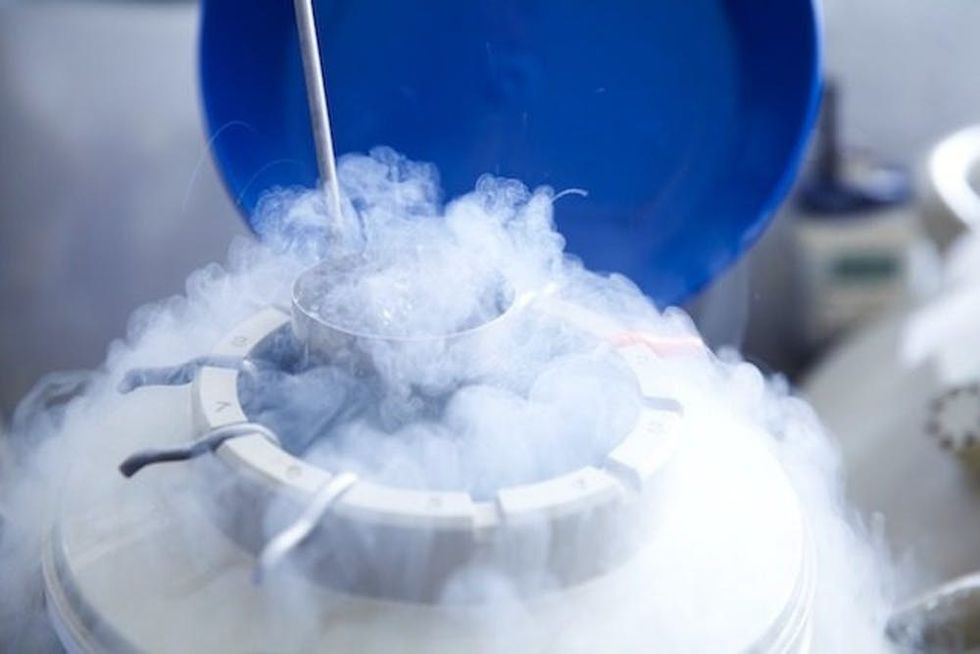It’s more common than you think.
Why Women Aren’t Using Their Frozen Eggs

We are lucky to live in an era when there are all kinds of fertility options for women who want to have children. We have birth control to make family planning safe and efficient, IVF for conception issues as well as those having a baby via surrogate — an amazing solution for women who aren’t able to get pregnant themselves. We even have the ability to freeze our eggs so that those of us not currently ready for kiddos can still ensure the possibility of future pregnancies. It’s truly an incredible time to be alive when it comes to the sheer amount of scientific advances in reproductive medicine.
Even with the abundance of fertility options out there, a recent study showed that most women who freeze their eggs don’t end up ever using them. In fact, researchers discovered that only six percent of women surveyed had used their frozen eggs to have a baby. Kinda crazy, right? And these results might sound pretty discouraging for anyone currently thinking about getting the procedure done. If women aren’t using the eggs they’re freezing, what’s the point of getting it done in the first place? We chatted with Trish McMorrow, nurse and clinical educator at Progyny, to get some answers.

NOT EVERYONE WHO FREEZES THEIR EGGS USES THEM
“I like to refer to egg freezing as akin to an insurance policy,” explains McMorrow. “Not everyone will use their frozen eggs, that’s inevitable.” In that sense, the results of the study aren’t that shocking. It’s true that many women have their eggs harvested and frozen specifically because they’re unsure about what their future holds, who their partner will be, and when they’ll want to have children. In fact, the number one reason cited in the study for not using the eggs yet was that the women hadn’t found a partner yet.
She also points out that the study itself had limitations. Some of the women surveyed had their eggs frozen only a couple of years beforehand, so it’s not surprising that they hadn’t used them yet. In addition, egg freezing is just beginning to gain popularity, and many women who are freezing their eggs now most likely won’t use them for years to come. With all this in mind, it seems it would be more accurate to conduct research 10 to 15 years from now to find out exactly how many women end up using their frozen eggs.

EGG FREEZING IS A PERSONAL DECISION
The takeaway, McMorrow says, is that “this study shouldn’t turn women away from egg freezing.” Ideally, anyone thinking about having egg freezing done should consult a fertility specialist and get all the facts about how it may (or may not) work for them. “Family planning is very personal and unique to each individual,” she says. “It’s not a one-size-fits-all method.” So who would she recommend the procedure to? “Any and every woman who is wanting or needing the peace of mind,” she says. “It can be for any woman whether she is in her 20s, 30s or even 40s.”
It’s also important to keep in mind that although the number of eggs harvested from a woman in her 20s will be different compared to the number in her 40s, the procedure can still provide a level of security for any woman (regardless of age) who’s concerned about her fertility timeline. In this sense, even when women aren’t using their eggs, they still get a major benefit from the procedure. “It is such a personal decision, and ultimately whether they end up using them or not comes down to their reasoning for why they chose egg freezing in the first place.”
What to consider
If you’re debating freezing your eggs but aren’t sure if it’s right for you, McMorrow recommends fully investigating the procedure and considering these questions beforehand:
- How do children fit in your future? After seeing a fertility specialist and getting all the facts, sit down and really consider your 5-10 year plan. Ask yourself questions like: Where do I see myself? What am I doing? Where do I want to go in my career? Do or will children fit into this equation? On a scale of 1 to 10, how important is it to have children? What’s the importance of having biological children?
- How many children do you want? Do you want children at 30 and again when you’re 35? Remember that the quality of your eggs decline as you age — meaning it could be harder for you to conceive later in life.
Have you thought about freezing your eggs? Tell us why or why not @BritandCo!
(Photos via Getty)









